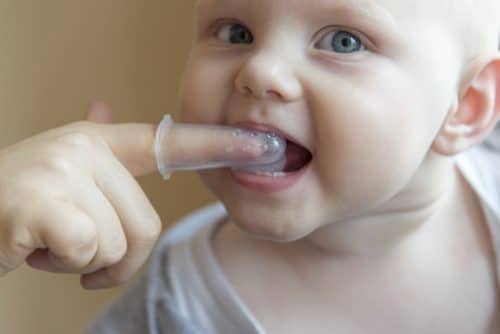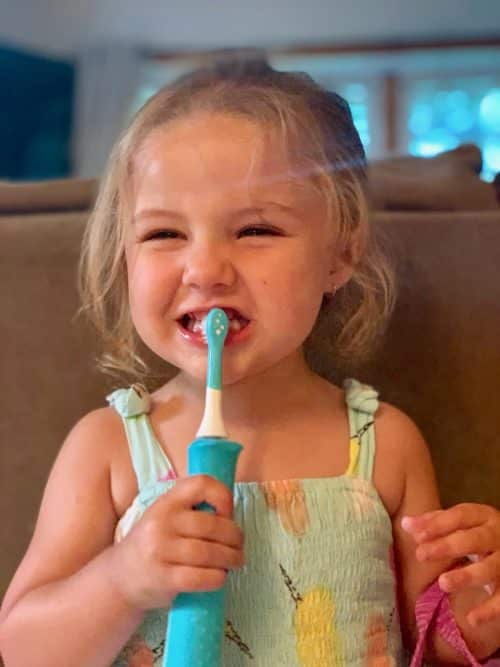Posted by: Maplewood Dental Arts in Family Dentist
Baby Teeth: Prenatal, Newborn, and Infant Dental Care
At Maplewood Dental Arts we really mean it when we say we are here to care for you and are committed to providing a LIFETIME of healthy smiles. This includes oral health care for pregnant moms, newborns, babies, toddlers and on for life! We also love treating children of all ages!

Raising a baby is one of the most challenging and rewarding experiences in life!! Careful pre-and-post-natal care is essential for your peace of mind, and the health of your new child.
This can include vitamins, extra doctor’s visits, ultrasounds, and more. Most people don’t realize that dental care is just as important as any other increased medical attention before and after baby is born. Just like any other part of a pregnant mother’s body, her teeth could have an impact on the growing life inside her!
Many women–about 65%–experience increased swelling and bleeding of the gums while pregnant. This is called “pregnancy gingivitis”, and is caused by fluctuating hormone levels.
Gingivitis makes one more vulnerable to nasty bacterial infections and tooth decay, so it’s important to stay on top of oral hygiene during pregnancy, especially flossing.
Regular dental visits are always recommended to make sure hygiene efforts are as effective as possible. Sometimes, pregnancy can also cause painful sores on the gums, known as oral gum lesions. They are less common than pregnancy gingivitis but also caused by changing hormone levels.
Morning sickness is an extremely common symptom of early pregnancy, and like any other instance of vomiting, can cause acid damage, erosion to teeth, and irritate the gums.
This is not good when paired with gingivitis or lesions described above–the stomach acid in vomit can exacerbate these problems, and wear down tooth enamel and increase risk of tooth decay, or cavities.
If a mother doesn’t properly address these prenatal oral health concerns, she actually risks passing down harmful bacteria in her teeth to her unborn child. Low birth weights and premature delivery have been linked with excessive cavities and tooth decay in pregnant mothers. It’s safe to say that no parent wants this–so floss, floss, floss, and make sure to consult your dentist during pregnancy!
After baby is born, it’s time for a new regimen of oral hygiene, this time inside baby’s mouth! Even though the vast majority of babies are born with teeth hidden inside cute little gums, some babies are born with one or two teeth–we will want to see your baby right away if this is the case, keeping their mouth nice and clean is still important as they teethe and grow.

A soft, clean cloth and lukewarm water are all you’ll need for this stage. Gently rub the cloth on baby’s tongue and gums with your finger after feedings to erase sugars and bacteria from milk or formula.
DO NOT put any baby to bed with a bottle of anything but water. Sending a baby to bed with formula, milk or juice can cause serious problems in the mouth and can cause what is called “bottle rot” of the baby teeth once the teeth have erupted.
Juice in any form should be avoided in babies altogether unless instructed otherwise from your pediatrician.
In the first 6 months, to one year, babies establish their bacteria flora in their mouth (good and bad bacteria) and often their flora is transferred directly from their caregivers. If their caregivers have a lot of cavities, then they have more bad flora than good, so it is important to limit the transfer of this bacteria so that your baby has a better chance of establishing a good flora in their oral cavity.
The best way to limit the transfer of this bacteria is to not taste food or temperature before feeding your baby, do not clean off pacifiers, or toys that land on the ground with your own mouth, be sure to have clean hands, and chewing xylitol gum can decrease the amount of your own bad bacteria flora while your child is establishing their own.
If your baby is having a hard time breast or bottle feeding properly, there may be a lip or tongue tie that should be evaluated as soon as possible. Lip and tongue ties can prevent proper feeding and nutrition, can also prevent proper development of the maxilla, or upper jaw can cause airway or sleep-disordered breathing problems in the future and can inhibit or slow proper speech development.
If you are unsure if there is a lip or tongue tie, it is always a good idea to have an exam done by a pediatric or family dentist to evaluate if there are ties that need to be addressed. It truly is never too early for your baby to see the dentist!
Teeth begin pushing through the gums between three and twelve months of age. According to www.whattoexpect.com, as soon as the first tooth appears, it’s time to start brushing.

Simply water is still a safe option to use on the first few teeth, but a TINY amount of fluoride toothpaste is safe to use and can be extremely beneficial: never more than a grain of rice in size. This small amount is safest in case baby swallows some of the toothpaste.
Do not reapply if baby swallows and have a fluoride-free toothpaste on hand if reapplying is necessary. Finger brushes or baby brushes with very soft bristles can be helpful in this stage, though the cloth is still effective as well.
Just like adult toothbrushes, baby toothbrushes should be replaced as soon as they become rough around the edges, or after three months, when nasty bacteria can start to build up.
Fluoride supplements may be necessary if there is limited access to public water for the proper formation of the adult teeth developing underneath the baby teeth. Please see a pediatric or family dentist to evaluate if fluoride supplementation is necessary and if so what dosage is appropriate, safe and effective.
When taking care of a new baby, it’s always important to consider all aspects of their physical health, from head to toe! Babies with good oral hygiene start on a path for a lifetime of healthy smiles; whether it’s with one tooth, three teeth, or twenty!
Dr. Andrea Taliento, DMD




